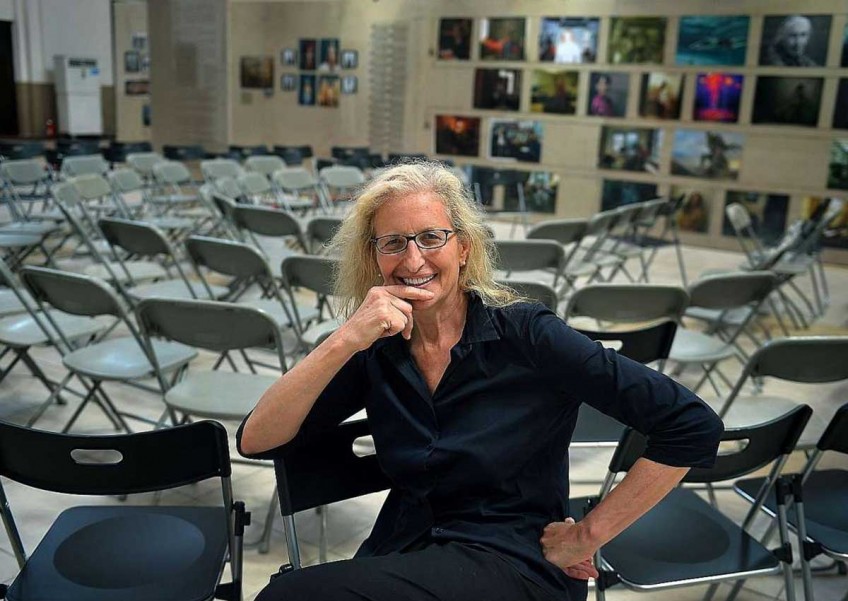Photographer Annie Leibovitz on personal loss and almost going bankrupt

People often look at her dramatically composed photographs featuring superstars, celebrities, politicians and imagine Annie Leibovitz's life as a jet-setting star photographer.
The 66-year-old is one of the world's top portrait photographers and has captured the world's most famous names including Britain's Queen Elizabeth and United States President Barack Obama. Her works have graced the covers of magazines such as Rolling Stone and Vanity Fair from as early as the 1970s. She has had many museum and gallery shows, extensively documenting the worlds of show business, fashion and celebrity.
All of her accomplishments suggest a glamorous, globe-trotting lifestyle. So it may be surprising to know that in 2009, she came close to bankruptcy when she could not pay a US$24 million loan. She had incurred heavy costs for renovating her Manhattan property. The finance company who lent her the money threatened to take control of not just her properties, but also her lifetime of work.
Thankfully, the situation was resolved with the successful renegotiation of the loan.
Ahead of her exhibition, Women: New Portraits, an exhibition of photographs commissioned by Swiss banking giant UBS, she gave an interview to The Straits Times.
She called that period one of "the hardest moments" of her life.
"I wish I was smarter," she said. "I felt as an artist I was only supposed to focus on the creative side. I let someone else take control of the business... It was a big kick in the pants. I blame myself for it."
But there have been lessons in surviving it. She plans to send her three daughters aged 10 to 14 to "some sort of business class" to learn how to manage their finances.
Besides nearly going broke, she also had to deal with intense personal losses. In 2004, her father died of lung cancer just weeks after the death of her long-time collaborator, writer and intellectual Susan Sontag. All these have made her look at life differently, she says.
"When I was younger, I was very brash. I felt you are nothing without my photograph."
Now, dressed in signature all- black, the 1.82m-tall Leibovitz still cuts an imposing figure, but her honesty and down-to-earth manner, charm and wit soften the first impression.
The works in Women: New Portraits also share that quality of understated strength and sense of truthfulness.
Held at Tanjong Pagar Railway Station, the exhibition features women of outstanding achievement from all walks of life, including artists, musicians, chief executives, politicians, writers and philanthropists such as Nobel Prize-winning teenage activist Malala Yousafzai, Facebook's chief operating officer Sheryl Sandberg, Myanmar icon and politician Aung San Suu Kyi and writer and activist Gloria Steinem.
The exhibition runs till May 22 and is free.
The show is a continuation of a book project she started with Sontag in 1999. Titled Women, it featured images of women from all walks of life, including United States presidential hopeful Hillary Clinton, coal miners, athletes, surgeons, socialites and soldiers. Sontag contributed an essay.
Leibovitz says that the current exhibition is a "work in progress just like all women are".
"I wanted to update the women's project portraying women dressing up to be women. Just as they are: real."
Her portraits feature individuals, but also start conversations about the many issues women face today.
One of the most arresting stories is that of South African paediatric Aids healthcare worker Denise Manong and her daughter, Linamandla. Denise is living with HIV, but her children are not.
After the birth of her daughter, Denise became one of more than 1,000 women in sub-Saharan Africa working for the grassroots organ- isation mothers2mothers. Among various other programmes, the organisation trains and employs mothers living with HIV to work alongside doctors and nurses in understaffed health centres.
Leibovitz captures Denise's strength and dignity, as well as the love she has for her daughter. They are photographed seated on a bed covered with an orange-red sheet, in a warm embrace.
Singapore is one of the stops in the 10-city tour of the exhibition, including Tokyo, San Francisco, Istanbul, New York and Zurich.
Gallerist Sundaram Tagore, who runs Sundaram Tagore Gallery in Gillman Barracks, says she brings together "tremendous artistry and taps so many powerful currents in contemporary culture". His gallery has hosted exhibitions of her work in Hong Kong and Singapore.
He says: "Through her powerful images, Annie has encapsulated the history of our times as viewed through her lens."
To reach out to more people, organiser UBS is offering a series of talks centred on women, as well as free learning programmes and contests. One such contest was run in partnership with Singapore Press Holdings, where eight winners were picked in a lucky draw, having answered a question about the exhibition venue.
They got to preview the show and meet Leibovitz.
One of them was civil servant Candice Chan, 35, who said: "She gave a lot of insight into her work. I am quite inspired to pick up my camera again, it has been a long time."
Lawyer and art collector Valerie Cheah, 49, who also got a chance to meet the photographer, found her "kind, patient, warm and very genuine".
She was struck by how Leibovitz, surrounded by ardent admirers on opening night, spoke to every person who went up to her.
Ms Cheah, who has followed Leibovitz's images from her early Vanity Fair days, says of the new work: "What I particularly like of her new series is the real, relaxed settings in which she photographs her subjects. It is fantastic that UBS has commissioned Annie to continue this series on the changing roles of women. It is a very important conversation to have."

This article was first published on April 30, 2016.
Get a copy of The Straits Times or go to straitstimes.com for more stories.